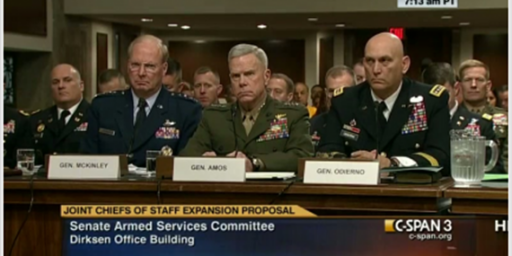Reid Calls Pace ‘Incompetent’ – So What?
When I saw the headline “Reid labels military leader ‘incompetent’” in my aggregator yesterday and then saw various bloggers citing the story about the Senate Majority Leader making disparaging remarks about the outgoing Chairman of the Joint Chiefs, I didn’t think much of it. After all, Reid is against the war, Pace is widely regarded by war critics as a “Yes man,” and Reid has a record since ascending to his current position of spicing up his rhetoric. So, the various strum and drang over the remarks struck me as unwarranted.
Bob Geiger, who was on the conference call in question, says The Politico‘s John Bresnahan, who broke the story in question, got it wrong when he reported that Pace “…called Marine Gen. Peter Pace, the outgoing chairman of the Joint Chiefs of Staff, ‘incompetent’ during an interview Tuesday with a group of liberal bloggers, a comment that was never reported.”
So, Reid didn’t say Pace was incompetent? Well, no, but the context was wrong.
What he said about Pace was not said in the spirit of throwing some rhetorical red meat to a bunch of liberal bloggers by gratuitously bashing General Pace — which is certainly what one could infer from The Politicos “reporting” on this story.
Rather, Reid was talking informally about George W. Bush’s refusal to dump Alberto Gonzales and told us what he said to Pace in a private meeting before Bush tossed aside the Chairman of the Joint Chiefs of Staff like a rotting fish.
Here’s exactly what Reid said:
“I guess the president, uh, he’s gotten rid of Pace because he could not get him confirmed here in the Senate… Pace is also a yes-man for the president and I told him to his face, I laid it out to him last time he came to see me, I told him what an incompetent man I thought he was.”
So, did Reid utter the word “incompetent” in the same sentence with General Pace’s name on the conference call? Yes, he did.
But in the context in which it was said — and based on Reid’s tendency to speak like the straight-talking, former boxer that he is — it all makes sense. And to those of us not looking for a Matt Drudge-worthy story, it hardly seemed remarkable.
Got that? Yes, Reid called Pace “incompetent,” but he did it in the spirit of assessing Pace’s competence. I’m glad we cleared that up!
Indeed, Fox News reports, “Senate Majority Leader Harry Reid confirmed Thursday that he told liberal bloggers last week that he thinks outgoing Joint Chiefs of Staff Chairman Peter Pace is ‘incompetent.'”
Reid’s predecessor, Bill Frist, laments Reid’s decision to “attack the uniformed military leaders who are working tirelessly to improve the situation in Iraq.”
Politicians walk a dangerous tightrope when they politicize military affairs, either by lambasting professional military officers or hiding behind them (e.g., arguments that criticizing a war is tantamount to not “supporting the troops”). One legacy of the bitter debate over Vietnam was a military officer corps that became partisan, barely concealing its contempt for Democrats, including commanders-in-chief Jimmy Carter and Bill Clinton. The less we use military officers as props in political debates and keep the discussion on the level of elected policy-makers, the better.
At the same time, Steve Benen and Kevin Drum are right: The senior-most members of the armed forces, certainly the service chiefs and Chairman, are policy makers and fair game for criticism.
Pace, if he’s doing his job, is not some platoon leader, or even division commander, merely carrying out his orders to the best of his ability. Rather, he is — by statute — the chief military advisor to the president. One can not discuss military affairs, let alone the conduct of a war, without implicating his decision-making.
Further, if politicians can sing David Petraeus’ praises as a military genius (because he, as a senior general, single handedly invented counterinsurgency doctrine) then why can’t they criticize those, like Pace and George Casey, whose decisions they deem poor?
If Reid were making personal attacks on our officer corps or soldiers, I’d be the first in line to say that was beyond the pale. But criticizing the technical and tactical judgments of senior appointees who must be confirmed by the Senate? Not so much.
UPDATE: Taking slightly different angles, Ed Morrissey questions Reid’s competence (also fair game) and Taylor Marsh argues that “this is a gift for the Republicans.”






Do any of Reid’s critics, or JJ/OTB posters, have any evidence that Pace *is* competent?
I recall only that he started off being willing to contradict Rumsfeld on a couple of things, and then was apparently yanked back on the leash.
I visit this blog because I perceive you to be an intelligent, well informed and balanced conservative and/or republican.
My own politics are slightly left of center and I’ve never been very partisan — voting conservative democrat or liberal republican.
But over the last decade I’ve essentially become anti-republican — but not necessarily pro-democratic — because it looks to me like the republican party had been hijacked by a group of
fundamentally dishonest extremists.
So I’m finding it very informative watching you finally come to the realization that the republican party no longer represents your beliefs
and to start rejecting the “disinformation”
these dishonest extremists spread.
Is this the same guy who, during a speech on memorial day, got the number of American dead in Iraq wrong?
Neither party represents my views particularly well. That’s the price of big tent, catch-all parties. But, yes, the party leadership has moved further away from Barry Goldwater-style libertarian-conservatism and even Ronald Reagan small-government conservatism as religious conservatives have become more organized.
There’s plenty of dishonesty from both sides, methinks. That’s the nature of propaganda, I’m afraid. Activists of all stripes have gone into permanent “campaign” mode sending out hourly talking points.
Btw, the incident is perhaps most interesting for what it says about the Dems and their kibbitzers.
When it was reported that Reid called Pace incompetent, the Dem-friendly response wasn’t “Damn straight!”, but rather, “Surely he didn’t really say that exactly ….”
Another insight into how the Dems lose elections.
Seantor Reid’s comments on this topic haven’t changed my opinions of him one iota. I’ve always loathed him as a partisan hack who was in over his head since he assumed a leadership position in the Senate. Mind you, that’s true of a depressingly large number of our elected representatives on both sides of the aisle, though I’m not sure whether that says more about me or them.
I would rather be a yes man then an incompetent man.
I would rather be a yes man then an incompetent man.
Don’t limit yourself — perhaps you, like Gen. Pace, can be both.
It seems rather silly to call General Pace incompetent. It is entirely possible that he may be wrong about some things or that he may have made some bad decisions or that he has given some advice that was not sound, especially from the perspective of those with the benefit of hindsight and/or partisan blinders. But incompetent? Please.
This is far from an original thought, but perhaps the folks you need to win a war aren’t the same as those you need to administer the peace afterwards. It isn’t hard to find lots of examples for this.